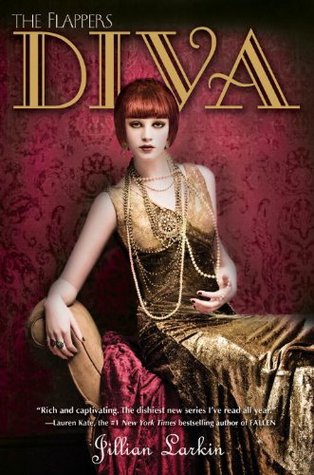The Flappers: Ingenue and Diva, by Jillian Larkin
Mar 6
2013

I wasn't overly impressed by Vixen, the first book in Jillian Larkin's Flappers series. It wasn't terrible, but it was the kind of book I read and immediately forgot, so I attributed most of its success to a one two-punch of trendy subject matter and gorgeous cover art. Happily, Larkin's trilogy improved steadily over the course of its run, and by the end of the series I was genuinely sorry to say goodbye to the characters. (Well... some of 'em, anyway.)
Vixen introduced three young women coming of age in Prohibition-era Chicago, but Ingenue and Diva move the action to New York City. Formerly a sheltered socialite, Gloria has shocked everyone by falling in love with a black piano player and running away with him to New York, hoping to become a nightclub singer. Gloria's former best friend Lorraine hasn't forgiven Gloria for what she perceives as a betrayal. She's hell-bent on revenge, and plans to use her new job as the manager of a speakeasy to get it. Gloria's cousin Clara, meanwhile, is torn between her loving, respectable fiancé and the allure of her old life as one of New York's wildest flappers. None of the girls are entirely happy with their choices, and that's before Larkin tosses in an assortment of FBI agents, mobsters, con artists, and highly unsuitable alternate love interests.
Characterization is Larkin's biggest weakness. Any scene with prickly, impulsive, selfish Lorraine was fun, and Clara could be entertaining, but Gloria was deadly dull. I tried to care about her singing career and her forbidden romance, but it was like trying to project drama onto a Cabbage Patch doll—the character just wasn't built for it. Thankfully, Clara and Lorraine play larger, richer roles in Ingenue and Diva, which helped tremendously. I still found most of their actions implausible, but at least they didn't bore me to tears while they were doing them.
Boring heroine aside, however, I liked these books. Larkin clearly had a wonderful time playing with period slang and costumes, and by the third book had begun to show signs of a biting sense of humor. I wasn't particularly invested in the girls' romantic entanglements, but I did enjoy their intense, frequently acrimonious relationships with one another, which inspired a wish that Larkin had written her series as a television show instead—solid actors could paper over the holes in her characterization, and the over-the-top plot twists and fabulous vintage style would have made for ridiculously watchable TV.
Review based on publisher-provided copies.
Vixen introduced three young women coming of age in Prohibition-era Chicago, but Ingenue and Diva move the action to New York City. Formerly a sheltered socialite, Gloria has shocked everyone by falling in love with a black piano player and running away with him to New York, hoping to become a nightclub singer. Gloria's former best friend Lorraine hasn't forgiven Gloria for what she perceives as a betrayal. She's hell-bent on revenge, and plans to use her new job as the manager of a speakeasy to get it. Gloria's cousin Clara, meanwhile, is torn between her loving, respectable fiancé and the allure of her old life as one of New York's wildest flappers. None of the girls are entirely happy with their choices, and that's before Larkin tosses in an assortment of FBI agents, mobsters, con artists, and highly unsuitable alternate love interests.
Characterization is Larkin's biggest weakness. Any scene with prickly, impulsive, selfish Lorraine was fun, and Clara could be entertaining, but Gloria was deadly dull. I tried to care about her singing career and her forbidden romance, but it was like trying to project drama onto a Cabbage Patch doll—the character just wasn't built for it. Thankfully, Clara and Lorraine play larger, richer roles in Ingenue and Diva, which helped tremendously. I still found most of their actions implausible, but at least they didn't bore me to tears while they were doing them.
Boring heroine aside, however, I liked these books. Larkin clearly had a wonderful time playing with period slang and costumes, and by the third book had begun to show signs of a biting sense of humor. I wasn't particularly invested in the girls' romantic entanglements, but I did enjoy their intense, frequently acrimonious relationships with one another, which inspired a wish that Larkin had written her series as a television show instead—solid actors could paper over the holes in her characterization, and the over-the-top plot twists and fabulous vintage style would have made for ridiculously watchable TV.
Review based on publisher-provided copies.
Posted by: Julianka
No new comments are allowed on this post.
Comments
No comments yet. Be the first!